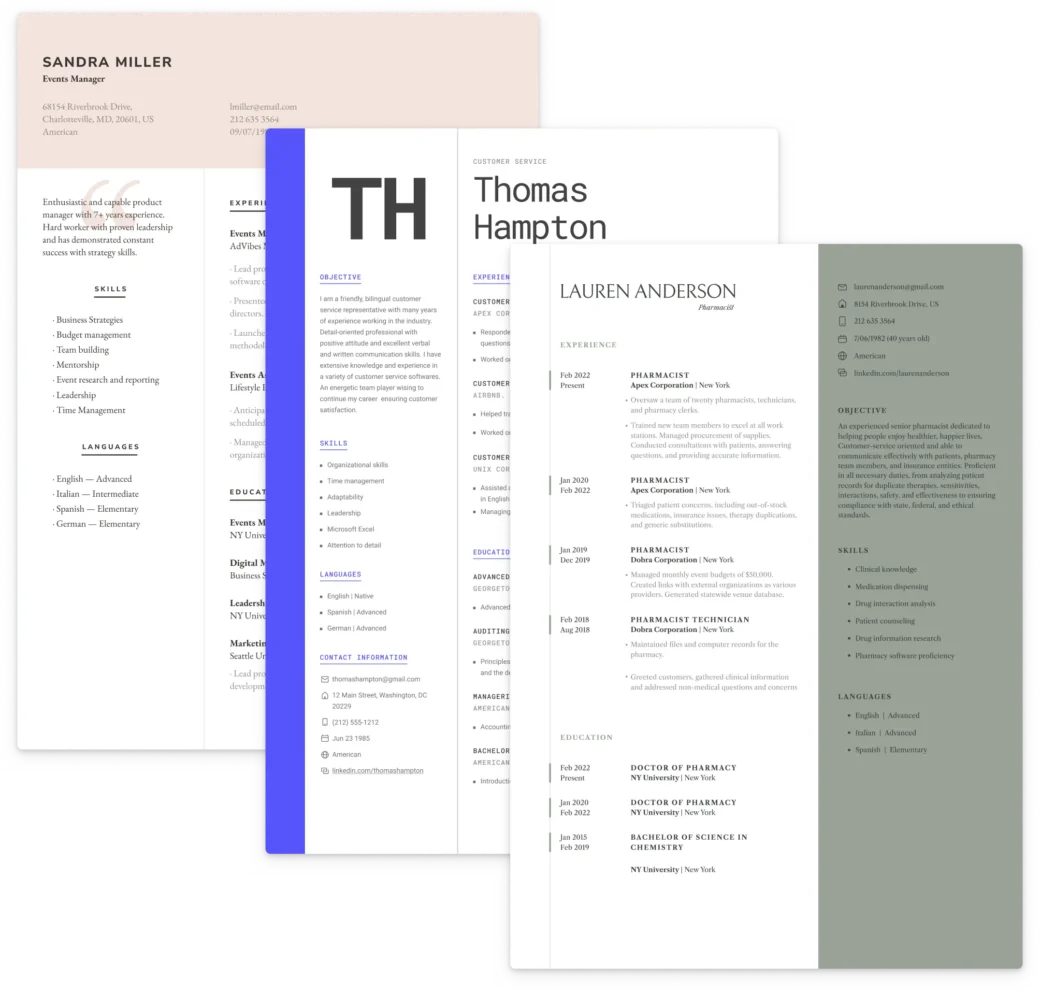All through our young lives, when we were in elementary school, middle school, and beyond, we had report cards and exams to worry about. Once college is over, we should never have to worry about our grades again, right?
It might not be that simple.
During high school and college, it gets more serious when we get judged by our GPA scores. Your GPA is essential for getting into the college of your choice, but once that process is over, do we still need to have a high GPA for the future?
If you have just graduated from college, completed your master’s degree, or are in your senior year, you may be asking yourself, do I need to list my GPA on my resume?
The answer is, it depends.
There are specific moments when adding your GPA to your resume is a great choice. However, sometimes it might be the worst thing you could do for your job application.
Using our resume builder to list your GPA helps you format your resume correctly and present your academic achievements clearly to hiring managers.
In this guide you’ll learn why your GPA is important, but when and when not to add it, how to list a GPA on your resume, and more.
Keep reading to find out what to do if you think your GPA score isn’t the best, and other strategies to create a job-winning resume that includes your grade point average.
What Is a GPA and Why Is It Important?
A GPA is a measure of academic performance. It’s calculated by dividing the total number of grade points earned by the total number of credit hours attempted.
In general, college GPA scores fall into two categories:
- Overall/Cumulative GPA
- Major GPA
Your overall GPA mentions your accumulated grades for all the subjects you took, while your major GPA only refers to your grades for subjects related to your major.
These scores can be important for getting into a master’s program or applying for a position when you are fresh out of college.
A boss may want to see you are a well-rounded person and learner and like your overall GPA, or they may just be interested in the grades for your major.
In general, a higher GPA shows that you’ve had more success academically, which may be seen as an indicator of your capabilities when applying for jobs.
Adding your GPA to your resume is normally up to you. Not that many employers will specifically ask for your college grades straight away. However, it may be better or worse to add it, depending on the available position and what the rest of your resume looks like.
Should I Put My GPA On My Resume?
So, the question you are probably asking yourself by now is, when exactly should I add my GPA?
There are some specific moments when adding your college GPA to your resume will be critical.
Some of these moments include if…
- You are specifically asked by the hiring manager.
- You had a high GPA.
- This is the first job you are applying for.
- You are a recent college/master’s graduate.
If you had a 3.7 or higher and graduated with honors, then it might be beneficial to include your GPA on your resume.
💡TOP tip
Highlight your scores in the courses related to the position you are applying for.
If you were one of the geniuses in the class, it probably wouldn’t ever hurt for you to add your GPA. It wouldn’t hurt to show you were capable of getting a 4.0 or 3.9 throughout college.
Also, if you are a recent college graduate or this will be your first job, you should add your GPA. As a high school student looking for a summer job or internship, it would be fantastic to show that you are a dedicated student.
As a recent college graduate, you’ll have your lack of real professional experience going against you. That means you have to show what you got, and if it’s a high GPA, then you should show it off. If you’re still professionally inexperienced, a resume template can help you add all of this information without making it look forced in.
When to Avoid Listing Your GPA on Your Resume
A GPA is technically not crucial for a resume. So there are some circumstances where less is more, and you should avoid adding your college or high school grades to a job application.
Below, you can find some examples of times to avoid adding your GPA to your resume.
You have a low GPA
If you have a GPA below 3.0, don’t include it on your resume, unless specifically asked. This can make a company question whether or not you’re capable of performing well at your company.
Your employer will likely look more into why your GPA was so low, and if they find that it was due to poor time management or academic support, they may be less interested in hiring you for the job. A better strategy would be to focus on other strengths, such as leadership abilities and volunteer work.
Do not under any circumstances try to cover up your grade point average with false information.
If the job doesn’t require a degree
Some jobs don’t require any degree at all. If you apply for a job like this, your grade point average may just be irrelevant information.
While you may mention some skills you learned while studying or how you had success in the classroom, you might just want to leave your GPA out of the resume.
You have professional experience
As you have read, a high GPA score can help someone who is a recent graduate or hasn’t worked a full-time job yet.
If you are someone that has professional experience, it would be a good idea to leave out your grade point average.
More than likely, a job recruiter will care much more about your experience than college scores, so don’t add any distractions
Where to Put Your GPA on Your Resume
If you feel adding your GPA to your resume is the right thing to do, you’ll need to figure out where it should be included.
Checking out resume examples can be helpful to get an idea. However, it’s pretty simple where you should put your grade point average, and that’s in a dedicated section that comes further down the page.
Your GPA should be listed under the education section of your resume.
Try not to go into too great detail, you don’t need to add your scores for every class or both your bachelor’s and master’s degrees. The achievements and awards section of a resume can also include your GPA. For example, if you ended up on the Dean’s List, it would be a good idea to add it to this specific section.

Build your perfect resume with ease
Craft the perfect resume effortlessly with our builder. Get started today!
How to Format Your GPA on Your Resume
While you have learned the best place to put your grades is in the education section of your resume, it’s essential to know exactly how to put the GPA on your resume.
Using the correct resume format is essential, especially in this case when you probably do not have much work experience.
You can also include both a major GPA and a cumulative GPA when adding your college grades.
These details can be added, and you can still avoid going into too much detail about your grades and the courses you took.
Here are some examples of how the section should appear.
Wrong ❌
2016 BS in Chemistry
ABC University, New York, New York
My GPA was 3.7 in all of my majors, while my cumulative GPA was 3.8.
This is not bad, however, it just goes on a bit too long. Let’s have a look at how your grade point average should be included.
Right ✅
2016 BS in Chemistry
ABC University, New York, New York
Overall GPA 3.9 | Cumulative GPA 3.8
This makes it much easier to scan for a hiring manager, and you can still show the scores you got.
If you are a high school student, you will not have a major GPA. Use a high school student resume template to help you find a job, as your resumes are normally different from college graduates.
Example of GPA on a Resume
If you have honors, distinctions, or other awards listed on your transcript that are relevant to the job posting, include those in addition to your grade point average.
Below is an example of how adding your GPA and achievements together should look.
XYZ University
2012-2016
Bachelor of Arts in Art History
Major GPA 3.7 | Cumulative GPA 3.8
Honors/Awards: Dean’s List 2012-2016, U.S. Innovative Art Award 2015
A GPA is a good way to show that you have the skills needed to be successful in school and at work. With this guide, you can figure out if it’s necessary to add your GPA and how to do it if you do.
Related Posts
